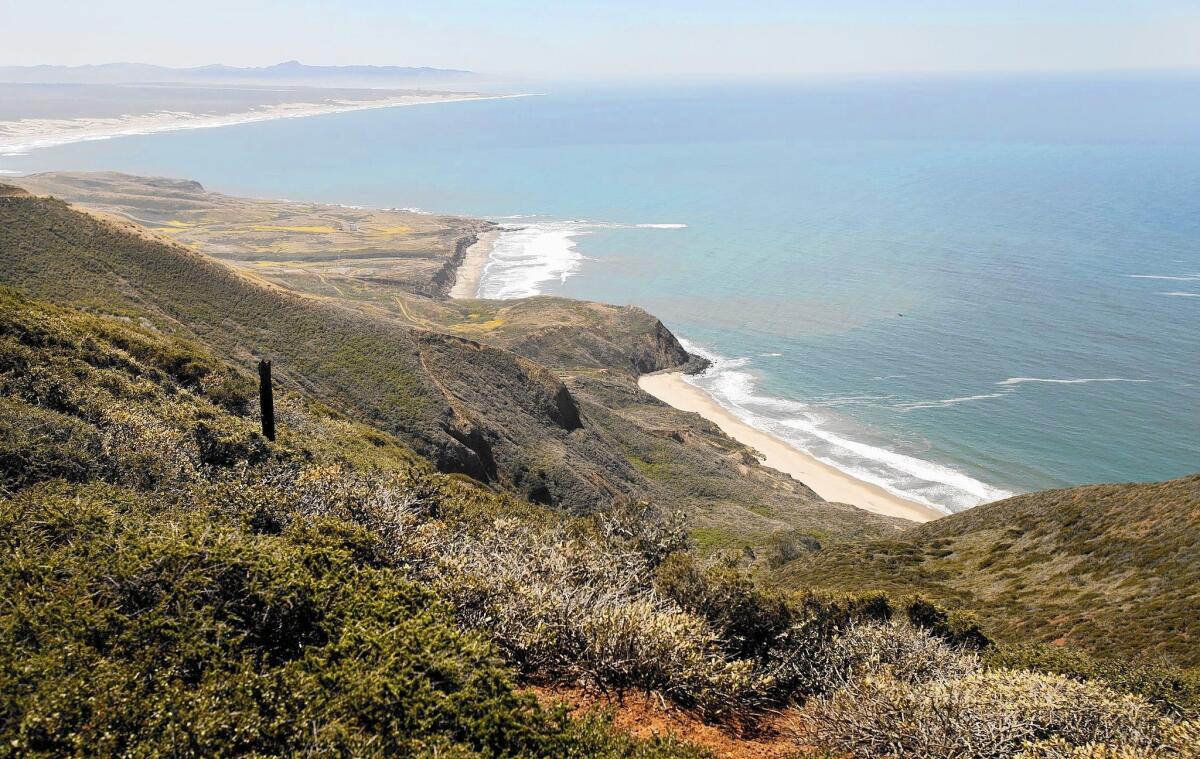Santa Barbara County oil-drilling project elicits worries

REPORTING FROM SACRAMENTO — It’s been 45 years since a calamitous spill off Santa Barbara coated the picturesque coast with oil, killed wildlife and prompted tough new pumping restrictions. But new worries have emerged in Sacramento.
It turns out that there was an exemption in a 1994 law that still allows drilling in a single portion of state-controlled, coastal waters. And a Santa Barbara lawmaker wants to immediately halt any possibility of drilling.
It’s no idle worry. There is a Northern California businessman with a project to lease land in Santa Barbara County, drill under the ocean floor and pump oil from a place called Tranquillon Ridge.
To Bob Nunn, California oilman, developer and farmer, his plan is safe, smart and profitable. But not to state Sen. Hannah-Beth Jackson (D-Santa Barbara), who wants to stop the project before it gets started.
In June, she quietly amended an unrelated bill to close what she called a loophole in California law that could allow drilling from an offshore oil field that’s partly in state-controlled waters off Vandenberg Air Force Base in Santa Barbara County.
Approval of her proposal would “end the conversation once and for all,” she said, and “make a statement from the people of California reaffirming their commitment to protect the coastline.”
It also comes at a time when environmentalists are pushing a local initiative, Measure P, to ban fracking and other controversial types of land-based oil drilling in Santa Barbara County.
Meanwhile, Nunn’s company — Sunset Exploration Inc. — and partner Exxon Mobil Corp. want to get at the Tranquillon oil by drilling horizontally under the ocean floor from land on Air Force property, not from an ocean platform.
To do that, they’ll need to obtain permission from a long list of government agencies — state and federal — beginning with the Air Force.
But Jackson doesn’t want the process to get that far. She introduced her bill, which would need to be passed by Aug. 31, out of concern that the Air Force might give a preliminary blessing to Nunn’s proposal to pump Tranquillon crude.
The measure is expected to be heard Wednesday in the Assembly Appropriations Committee.
Passage of the bill, SB 1096, is consistent with a state government policy to “get off these dirty fuels,” Jackson said.
At issue is the 20-year-old law that banned the approval of new oil and gas production leases in state waters, which extend three miles out to sea from the beach. The California Coastal Sanctuary Act states that “oil and gas production in certain areas of state waters poses an unacceptably high risk of damage and disruption to the marine environment.”
The act, however, contains a significant exemption: It allows the State Lands Commission, an obscure but powerful state agency, to approve a new oil-drilling lease.
To do so, a majority of the three-member panel must declare that oil under state waters is being drained by nearby platforms in adjacent federal government-controlled areas, farther offshore. Tranquillon is the only spot on the California coast that would be affected by the exemption, experts said.
The basin holds an estimated 150 million barrels of high-quality petroleum that could flow for as long as 30 years, according to a Lands Commission report.
A portion of oil in the state zone is being sucked into federal jurisdiction by pumps on nearby Platform Irene in federal waters. The siphoning is denying the state hundreds of millions of dollars in royalty payments, Sunset’s Nunn said.
Those lost revenues could flow back to the state and local governments if new wells are drilled on land at Vandenberg, he said.
What’s more, Nunn contends, drilling from land is safer than platform drilling.
“We never intersect the marine environment,” he said. “We drill vertically approximately half a mile and then drill out under the seabed.”
A recently released Air Force “opportunity assessment” of Nunn’s proposal concluded that onshore drilling could be economically beneficial and less environmentally risky than offshore drilling. However, it also noted that environmental critics of both types of drilling have raised “valid concerns.”
Environmentalists want none of it.
“There are more than a dozen significant, unavoidable impacts to the environment. A lot are related to oil spills,” said Linda Krop, an activist attorney at the Environmental Defense Council in Santa Barbara. “The risks and the impacts are too great, and there are no benefits.”
This is not the first time these issues have been the subject of studies, environmental analysis and political debate.
A 2008 environmental study concluded that “oil spill impacts for marine biology, marine water quality and commercial/recreational fishing would be reduced but not eliminated” by drilling from land.
Those concerns are certain to be re-evaluated if Nunn and his partners move ahead. The Air Force, Santa Barbara County, the State Lands Commission and the Coastal Commission all have a role in approvals before any drilling could begin.
Nunn pointed out the Lands Commission in 2009 considered — but rejected — a related plan that had widespread support from Jackson and local environmentalists.
The 2009 plan also sought to tap Tranquillon, but from the water at Platform Irene — not from the shore. In turn, the drilling company agreed to remove offshore platforms — as well as two onshore crude processing plants — by 2022. But the Lands Commission killed the deal by a 2-1 vote.
Nunn’s proposal is not worth the risk to Santa Barbara’s tourism, recreation and fishing industry, Krop said.
That’s why Jackson says she’s in a rush to pass her bill. “We need to close that loophole,” she said, “so there won’t be any question or attempt to expand drilling, whether on land or off land.”
Twitter: @MarcLifsher
More to Read
Inside the business of entertainment
The Wide Shot brings you news, analysis and insights on everything from streaming wars to production — and what it all means for the future.
You may occasionally receive promotional content from the Los Angeles Times.











